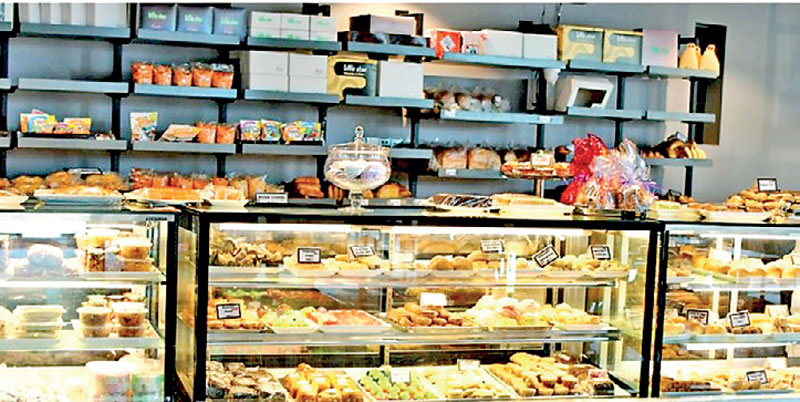Monday Feb 23, 2026
Monday Feb 23, 2026
Monday, 28 March 2022 03:28 - - {{hitsCtrl.values.hits}}


By Charumini de Silva
The worsening multiple economic crises have forced over 1,000 bakeries and 50% of canteens to shut, leaving thousands of people without a livelihood.
It was pointed out that stakeholders engaged in the bakery and food industry are bulldozed by the rising costs, shortage of key ingredients, loss of power, dearth of fuel, and negligence of authorities to overcome the situation has led thousands of people being unemployed and in a vulnerable economic position.
“Over 1,000 small and medium scale bakeries have been closed.
Even those bakeries that are in operation, only work three or four days, given the dearth of key ingredients, gas, fuel for transportation, and rising costs.
“The mobile bakeries or the fondly called ‘Choon paan’ are one of the most impacted. We are unable to absorb the price fluctuations and rapid uncertainties in the market. This is all now heading towards the end of the industry which is just around the corner,” All Ceylon Bakery Owners Association (ACBOA) President Newton Jayawardena told the Daily FT.
He said these small and medium-scale bakeries were able to manage their business with Rs. 15,000 on a daily basis but given the current context even if they have Rs. 50,000, the businesses are unable to operate.
“We cannot estimate the economic cost of all this situation because it is vast. It includes costs of transport, fuel, gas, electricity, wood, imported ingredients such as flour, margarine, oil, sugar, yeast, fish, meat, eggs, vegetable, labour, and the list goes on.
“The Government changes policies every fortnight and it is a very unhealthy economic situation,” he added.
ACBOA President also said the demand for savoury items, bread, and cakes has dropped drastically, as the public cannot afford to buy them due to higher prices.
“A loaf of bread that has few shelf days and sold at the supermarket ranges between Rs. 250 to Rs. 300. Other bakeries sell a loaf of bread between Rs. 110 to Rs. 150, while the moderate grade loaf of bread is sold around Rs. 90 to Rs. 100. Although part of an industry, we are also humane and feel for the hardships of the common man,” he stressed.
Jayawardena said over 200,000 people are directly and indirectly engaged in the bakery industry countrywide.
The weakening economic conditions have also impacted the canteen and its related industries severely, where 50% of them have closed down already.
“Canteens and small eateries that were operated by families have closed, as they could not absorb the never-ending internal and external pressures, whilst the business models that are more formal are continuing as they are financially bound by credit facilities.
“Our stakeholders are represented in street-level eateries to the public and private sector canteens. Thus, the impact of this economic crisis is enormous,” All Island Canteen Owners Association (AICOA) President Asela Bandara told the Daily FT.
The scheduled power cuts, soaring fuel prices, skyrocketing ingredients, vegetables, fish, eggs, and meat have severely affected the industry, he said, adding that there are half a million people directly and indirectly dependent.
“We store poultry and fisheries products for the entire month, but with the existing power cuts, we can no longer store them or any desserts such as ice cream, yoghurt, or puddings. We also cannot go shopping on a daily basis due to the shortage of fuel and high transportation costs,” he stressed.
He said the problem is deeper than what the authorities portray, or they do not understand at all.
“A nutritious meal equals a healthy community and a workforce. Unfortunately, our policymakers are only concerned about their families and their period at the office in the five years. Given the dire economic status, people now only eat a wade, two or three parathas with mixed gravy along with plain tea for around Rs. 120 and skip lunch and dinner, as they no longer can afford a healthy meal.
“I am sure that this lifestyle will lead to a very unhealthy population in the next couple of years and there will be no medicine also to treat these complex illnesses,” Bandara claimed.
Previously, people used to buy a good portion of rice and curry with a choice of their protein for around Rs. 110 to Rs. 150, but now, it has increased to Rs. 300 and more.
“It is said that not only our business is deteriorating, but also the purchasing power of people and their health. After all, we are also part of this community,” he pointed out.
He also highlighted that the adverse impacts were also reflected on home-cooks and women entrepreneurs.
“The eateries and canteen food such as string hoppers, pittu, milk rice, helapa, pancakes, bibikkan are sourced through small-scale home cooks. But increased prices are not absorbable to these segments of the community to continue their businesses.
“We also see a drastic drop in demand at public (hospitals) and private sector canteens, as the purchasing power, as well as the welfare offered to staff, has been limited,” he added.
Bandara said the economic cost of all these sums to billions of rupees, but it has not been calculated thus far.
The AICOA President said the rising costs were also adding on to the wages of their staff and because many businesses could not cope with it, the majority of those cooks have shifted to the construction industry as labourers.
Noting that within the eateries and canteen industry there were multiple other invisible sub-sectors such as waste collectors, various helpers, suppliers of materials, he stressed all of them have today lost their livelihood.
“We cannot see light at the end of the tunnel. I think if the Government does not care for its people, they should step down rather than watch them suffer and die,” Bandara asserted.
